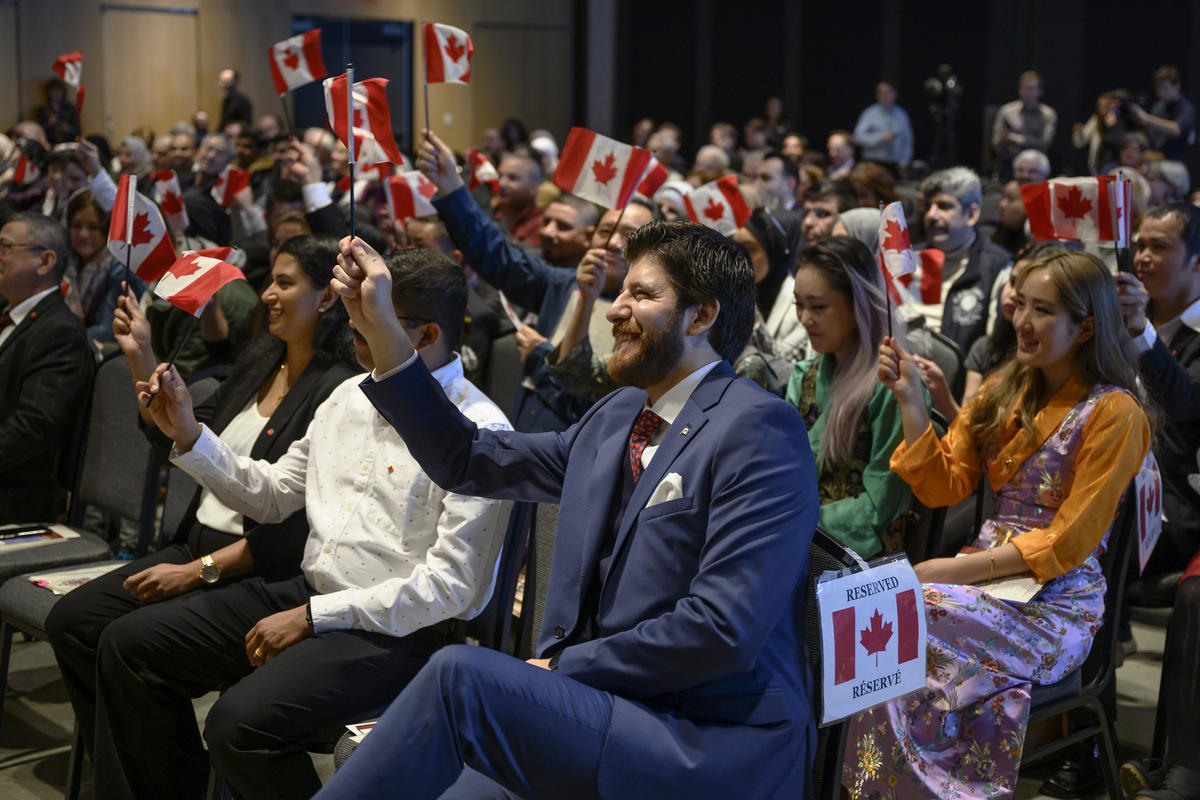In the wake of the government’s plan to attract more than 1.3 million newcomers to Canada over the next three years, a new poll shows that the majority of Canadians think immigration is having a mostly positive effect in the country.
Three-in-four Canadians, or nearly 75 per cent, “believe the hard work and talent of immigrants makes Canada better,” and nearly 65 per cent “believe immigrants should only be allowed in Canada if they adopt Canadian values,” the final report from the online poll of 1,000 adults conducted by Research Co. found.
According to Mario Canseco, president of Research Co. and the author of the report, the poll conducted last week showed that some political and regional disparities persist across the country.
“Majorities of Canadians who reside in Ontario (58%), Quebec (56%), Alberta (also 56%), Atlantic Canada (54%) and British Columbia (also 51%) hold favourable views on immigration,” he writes.
“Conversely, 36% of residents of Saskatchewan and Manitoba call for a reduction in immigration levels.”
When it comes to political stripes, “almost seven-in-ten Canadians who voted for the Liberal Party in the 2021 federal election (69%) think immigration is having a mostly positive effect in Canada, compared to 60 per cent among those who supported the New Democratic Party (NDP) and 46% among those who cast ballots for Conservative Party candidates.”
The study continues: “Canadians who voted for the Conservatives in the 2021 federal election are more likely to call for newcomers to Canada to adopt Canadian values (80%) than those who cast ballots for the Liberals (65%) or the New Democrats (55%).”
An ‘ambitious plan’
Minister of Immigration, Refugees and Citizenship Canada (IRCC) Sean Fraser announced yesterday that Canada aims to attract about 1.3 million new immigrants over the next three years to help fill critical labour shortages and fuel post-pandemic growth.
The 2022–2024 Immigration Levels Plan aims to continue welcoming immigrants at a rate of about one per cent of Canada’s population, including 431,645 permanent residents in 2022 (an increase of about 21,000 people from its original plan), 447,055 in 2023, and 451,000 in 2024.
“We think it is a good plan, albeit a very ambitious plan,” said Betsy Kane, a steering committee member of the Canadian Immigration Lawyers Association (CILA).
“I think this is a good news story as long as the government can compensate for the backlog that was created, in part because the pandemic, and in part because their employees remain working from home and are not fully back in the office,” she told New Canadian Media.
Kane clarified that CILA did not call for the government to “pause” the intake of newcomers as was previously reported by NCM based on an article on the association’s website published prior to yesterday’s announcement.
More specifically, NCM’s report was grounded on CILA’s suggestion that the IRCC use this year as an opportunity to “catch its breath” to allow many of those who have been waiting in limbo during the pandemic to finally land as permanent residents.
“Canada needs to continue to welcome more immigrants but announcing more ambitious targets under the 2022-2024 levels plan may be ill-timed…While using this year as an opportunity for IRCC to catch its breath would be far from ideal, it would be beneficial for several reasons,” CILA said in the post.
Critical lens missing
Jasraj Singh Hallan, the opposition Conservative Party of Canada’s Shadow Minister for Immigration, Refugees and Citizenship, said “the historic nearly two million immigration cases in backlog are holding back families and hurting businesses.”
“This is just another example of how Justin Trudeau and his Liberal government will say one thing and do another. Canadians and new Canadians alike deserve better,” said the MP for Calgary Forest Lawn in an email to NCM.
East Vancouver MP Jenny Kwan, who’s also the NDP’s Immigration Critic, called on the Liberal government to provide temporary foreign workers landed status on arrival.
“There are over 500,000 people who are already here in Canada. I am calling on the Liberals to bring in special immigration levels to regularize these workers to meet Canada’s labour skill shortage and implement the principle that if you are good enough to work, you are good enough to stay and grant temporary foreign workers landed status on arrival now,” she said.
Andrew Griffith, a policy analyst and former director general of IRCC’s Citizenship and Multiculturalism Branch, said the new levels are a continuation of the government’s strategy of growing the economy through increased immigration.
“The focus is on overall GDP growth, not per capita GDP growth and productivity, which increased immigration will not address,” he told NCM.
“I strongly believe a royal commission or equivalent is needed for a more independent look at immigration, one with a broader and more critical focus than the immigration industry perspective,” he says.
Editor’s note: a previous version of this article published on Feb. 15 incorrectly identified the Canadian Immigration Lawyers Association as being Vancouver-based when it is, in fact, a national organization.
A multiple-award winning journalist, Fabian Dawson is an internationally acclaimed author, filmmaker and media expert. His work over the last four decades spans the globe and he also serves as a consultant/strategic advisor to a variety of international companies. As deputy editor-in-chief of The Province, part of the Postmedia chain, Dawson led initiatives within a special publications group to provide directed content for a variety of organisations. He was named the 2019 recipient of the Bruce Hutchison Lifetime Achievement Award at Jack Webster Awards. Dawson has been invited by the governments of India, Malaysia, Taiwan, China, Hong Kong and the United States to act as a media observer/advisor on a variety of Asian-Canada issues. Dawson, now operates FD Media, which specializes in harnessing editorial assets to revenue generating opportunities.






All Canadians must be asked if more immigration is wanted!! We were never consulted, yet a small group changed our country thinking it was a great experiment, a failed experiment!! Too many people have their own cultures, religions and customs that don’t reflect our Canadian values!! There is over population in and around large cities making it crowded, miserable & expensive! There is a shortage of housing for Canadians never mind bringing immigrants here and it’s raising house prices! The illegals walking across the border in Quebec and other provinces, allowed to stay, & given free everything causes negativity and anger! These immigrants take our jobs because they are minorities and get special treatment! So no, the majority of Canadians do not want more immigration, we must take care of our own citizens, & we want a say!
We are admitting far too many immigrants too quickly. It seems there is an agenda being promoted by the economic elite to grow Canada’s population for the primary reason of spurring more economic growth. I worry that growing our population to the level advocated by some (90 t0 100 million) will have a devastating impact on our remining pristine natural areas. Already, wildlife habitat is being lost at an alarming rate and ecosystems are being overwhelmed by industrial development. Do we really want to become a version of the USA?
[…] post Immigration supported by most Canadians: poll appeared first on New Canadian […]